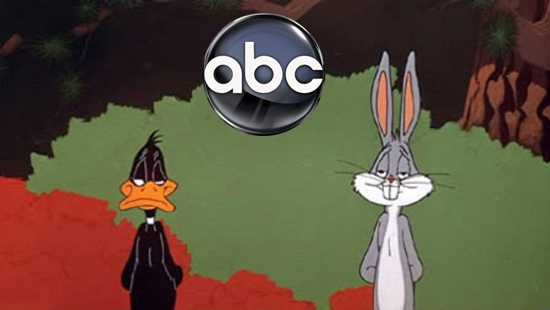
With the 2012-2013 Season behind us, there has been quite a bit of discussion – at least the places I lurk – on the absence of a cliffhanger. Some fans have bemoaned the lack of the suspense; upset that the series decided to tie up the storylines while threading out new ones. Other fans have been pleased that their season-long patience has been rewarded with the main story being paid off while new avenues have opened up.
I find myself in the second group for the first time. In the past I have loved the suspense. Take Season 3 of Supernatural: Dean killed by hellhounds; his soul dragged off to hell. It was a very long spring/summer until “Lazarus Rising.” Then there’s Criminal Minds Season 4: To Hell and Back, which left us with Hotch face to face with his nemesis, The Reaper; the voice over by Thomas Gibson as he closed out the case and wondered at the darkness they dealt with time and again. The final seconds are Hotch in his apartment, the Reaper in front of him pointing a gun at him and TG’s voiceover: “…sometimes the day – just – ends.” – BANG! — the sound of the gunshot between the words “just” and “ends” – fade to black. It was excellent!
Season 2 of NCIS: LA ended with great promise. Hetty gone to Romania to convince a clan there that Callen was dead and thus no longer a need for them to hunt him down; the team, aware of her plans, resigns and travels to Romania to rescue her. They arrive. Kill almost everyone at one site – in black ops style – and then Callen starts having flashbacks to his youth on the very beach they find themselves on: the shores of the Black Sea. We spend the summer wondering what Hetty knows and why Callen remembers this beach.
Those are just three examples of some cliffhangers that had me eager for the new season. Come fall two of them capitalized on those cliffhangers, making a half a season or even a season of the mysteries begun in those cliffhangers; one of them dropped the ball quite spectacularly, although the season opener was excellent.
And, of course, I cannot forget to mention Person of Interest’s Firewall. All the buildup with the FBI closing in on Reese, Alicia trailing Finch, HR working to put Reese in prison (or preferably in the ground) and it’s Harold Finch who gets kidnapped – by Root! First introduced in Episode 13, she triumphantly returns (and is revealed) in Episode 23. The final moments are of John alone and yes, a bit lost. He strides down the NYC sidewalk – the same place we saw him at the end of the Pilot episode – stares up at the camera and boldly tells it: “He’s in danger now, because he was working for you. So you’re going to help me get him back.” Pause. And then there it is: the ring of a telephone. All we see is John Reese pick up the phone and listen; it is 18 weeks or so until we know just who, or what, was on the other end.
Cliffhanger, what is thy purpose?
Is it to keep us on the edge of our seat while watching the episode, breathless for the next scene? Is it to leave us screaming “No!!!!!!” as it fades to black? Is it to tie up season-long or even multi-season-long threads all while opening new possibilities? Is it to leave us satisfied, full; comfortable that in four to five months our favorite show will return; in the meantime go watch something else and forget all about me? Well, actually, it’s all of those – except for the last part of the last one: “…go watch something else and forget…” I don’t think showrunners want that part to happen
Cliffhangers also have another job, one that is a bit tricky, but, if handled correctly, allows a show to breathe, expand, and refresh. This is also where the term cliffhanger has to be stretched a bit from its original meaning. See, the definition of a cliffhanger (according to the authoritative source known as Wikipedia) is a plot device in which a main character is in a precarious or difficult situation or is confronted with a shocking revelation. This is where it gets stretched a bit.
For instance, was Supernatural’s “All Hell Breaks Loose Part II” a cliffhanger? Well, yes, if you consider it shocking that the Yellow-Eyed demon was killed at the same time that the gates of hell were opened and a demon army was set loose; not to mention that Dean had made a deal: Dean’s life, in one year, for Sam’s now. — Yeah, that’s a cliffhanger. In the case of Supernatural it allowed the show to expand in Season 3 as Sam and Dean no longer had the life-long quest of finding the thing that killed their mother as the driving force. Since then the show has developed: angels and demons, heaven and hell, destiny and free will have all come into play and been explored. What started as a two brothers’ very personal quest has now developed into two brothers who save the world, several times. The powers of good and evil swirl about the Winchesters. It can be said with certainty that the show has gotten bigger. This is the cliffhanger that allows the show to reinvent itself.
However, there are dangers inherent in such a reinvention/expansion. For example, Season 3 of Supernatural had a rocky start. The writers/creators had killed off their big bad, along with that they killed the driving force for the brothers. Season 3 – marred by a writers’ strike – took some time to find its stride; when it did, the strike – um – struck. When it returned, it didn’t get its energy back until the final episode. It hit that out of the park, but the season as a whole was choppy (even as it is my favorite but that’s because it is the season I discovered the show, thus “Mystery Spot,” “Jus In Bello,” “A Very Supernatural Christmas” – oh, how I love thee!). The writers learned a lot from their Season 3 outing; Season 4 was perhaps the most cohesive season for this show to date.
White Collar similarly has used the cliffhanger as a method for reinventing itself. At the end of Season 2 the two-year mystery/hunt for the music box has paid off with a Nazi submarine full of art treasures. Ah, Neal Caffrey’s conman heart is full! The closing moments show us that he is in possession of those treasures, courtesy of the faithful (and scene-stealing) Mozzie! Where do we go from here? Season 3 was not the best as the constant back and forth, cat and mouse game of where is the treasure and Peter ‘knowing’ Neal has it but not really knowing (as in with proof) he has it wears thin.
The real journey of Season 3 is Neal discovering that he no longer wants to live by the con. He has a home and a purpose and people who care about him and who he cares about. Neal wants to stop running and makes his decision: parole board freeing him or not, Neal intends to stay with the FBI working as a consultant. ‘Tis not to be though and the season ends with Neal on the run, authorized with a nod of the head by Agent Peter Burke. It’s a brave new world come Season 4. Bringing me to my next topic with the cliffhanger:
To resolve quickly or not resolve quickly, that is the question!
Cliffhangers have to be handled with care. This is where the professionals are separated from the amateurs. Harsh, I know. But, if a show has taken a season, or at least a good chunk of the season, building up to the climactic point in the final episode, the payoff had better be good going forward, and I don’t mean good in the sense of huge pyrotechnics or massive deaths, but I mean take your time to resolve it. It took a long time to build to this point; don’t resolve it in five minutes and then go about the show as if it never happened. Also, if you’re reinventing/expanding yourself, pay special attention to pacing; it’s a marathon, not a sprint.
The Good:
White Collar closed Season 3 with Neal on the run. They wisely chose not to resolve that in the first episode. Now, keeping in mind that this show is breezy and light, don’t expect a whole lot of realism here. (After all, this is the show that had Neal Caffrey BASE jump off a high-rise building, glide smoothly to the street below, and walk away with no one giving him a second glance – oh, yes, and catching his signature hat that he had thrown from said building before he jumped — awesome to be sure, even better when he came clean to Peter about it, but not exactly steeped in realism.) Rather, White Collar chose to take two episodes, out of their season order of 16, to resolve that and then had the effects on Peter’s career take several more episodes to resolve.
Person of Interest took their time resolving Finch’s kidnapping. While the relationship between Finch and Reese, two damaged men slowly finding friendship and trust with each other, is a core element to the show, the writers were wise to take their time and give us almost two full episodes with these characters apart. Rushing the rescue of Finch would have made Root less of a nemesis than she needed to be. Once Finch was back safely, there was still some additional time taken in the next episode to explore the emotional/psychological trauma that he experienced.
Person of Interest also took their time resolving the mid-season finale of Season 2. (Mid-season finales are becoming more of a trend in television and networks have even taken to marketing these events. I like them, especially of the caliber that PoI presented this past season.) From “Shadow Box” to “Dead Reckoning” less than a week has transpired on the show; however, for the viewers, it was over six weeks. For four episodes the team dealt with the events that transpired at the end of “Shadow Box;” and the resulting consequences impacted the remainder of the season, with Bear and the Machine apparently suffering the most; although Bear – as most animals do – recovered faster. 😉 Also, the fallout from those events reverberated through the rest of the season and will impact the season to come. This show seeds its future plans carefully, and waits patiently for the harvest.
The Bad:
NCIS Season 9 gave us a multi-episode arc that left us, at the end of the season, with characters in peril: trapped in an elevator as an explosion rocks the building; caught in the blast with glass and the concussive force rushing over them, and the beloved Ducky suffering a heart attack on a lonely beach after hearing about the demise of the NCIS headquarters. That’s pretty powerful (even for a CBS procedural!) But, come September, the emotional fallout, which had been built up quite brilliantly in the prior season’s finale, falls victim to the episode’s momentum.
So eager to wrap up and move on, too much was crammed into the Season 10 one-hour premier. Tony and Ziva were rescued quickly, McGee had a wee little scratch (although he was face first with an explosive blast that disintegrated the squad room’s window all over him) and in the next scene he is smiling and joking that he needed nothing more than a Band-Aid to get him back to work, with a week passing, I believe, during a commercial break. There was no team interaction about any of the explosion, the danger, the fear, nothing.
While the creative forces did justice to Ducky’s ailment, taking several episodes to explore his physical and emotional situation — and the ever excellent David McCallum continues to plumb the depths of this character — the rest of the arc from Season 9 to Season 10 was tied up, neat and nice – all including a time jump of four months – in one 43 minute episode. Grr! (I do admit, Abby had a few emotional moments in one or two episodes and there was some time wasted spent on whether the bullpen would get a new color on the walls (alas, the awful tangerine remains).
NCIS: LA similarly did not do justice to its Season 2 to Season 3 cliffhanger, past the first episode. Familia was an excellent cliffhanger; Lange, H an excellent premiere as it picked up right where we left in May and played out in “real time”, but, then it stops being good. So much emotional material was laid out for the writers to explore for Hetty and Callen as well as the team; the team had quit, gone rogue and massacred people in a foreign country; Hetty had been shot protecting Callen; a new ops manager had been brought in who had hidden motives and a hidden connection to Hetty and none of that was explored except on the surface level.
The creative team of this show chose the dreaded time jump and skipped over all that goodness, jumping us four months into the future, apparently so that the characters would be the same September time frame as we the viewers. As if that’s important in make believe! In the next few episodes we got passing mention of Callen’s suspicions of the new ops manager, some peeks into his frustration with Hetty holding back important information and then, when she does reveal what she knows, he spends some time on a punching bag and simply forgives. Where were all the questions? Where was the hiccup in their relationship as he struggles to reconcile that Hetty has lied to him from the beginning of their relationship? And why was none of this ever mentioned again? Rather it was all silent, including the fact that some of those Romanian folk weren’t killed and could easily hunt Callen down, until the Hawaii 5-0 crossover where that show’s writers made use of that loose thread – and potential for great drama – and quickly dispatched the threat.
So sad when there is so much available for character development and it isn’t made use of…
And we’ve come back to the where we started:
2012-2013 Season is done. Several shows that I watch didn’t give the traditional cliffhanger: Criminal Minds tied up their season-long Replicator story, fairly neatly knitting all the threads into a cohesive garment; Arrow somewhat similarly closed up two long-running stories: Fyers on the island, and the Undertaking in Starling City; Person of Interest closed up shop with everyone safe and sound; yet in very different places mentally, emotionally, perhaps even professionally.
I have yet to watch Elementary, Supernatural and Season 7 of Psych – I’ve been archiving those shows on my DVR to help the lengthy hiatus go more pleasantly. I am finding that the lack of the big emotional moments, the fades to black with gunshots going off or bombs exploding, or brothers clutching each other while Lucifer begins to rise has left let me a bit more peaceful this hiatus. I like it. Perhaps it’s because I’m satisfied with how so many of my shows ran this past season; finding the right mix of bromance and humor and suspense and drama, shocking moments and quiet conclusions. Perhaps I’m more relaxed because I have several shows about to premiere for the summer: Longmire, Burn Notice, and Perception being just three of them. Perhaps the fact that I still have three shows stacked up on my DVR to watch has lulled me into believing the season truly hasn’t ended.
Actually, I don’t think it matters too much what the reasons are why I’m so content with this past television season’s cliffhangers. Truth is; I just liked them. For me, they did their job; they entertained me, at times had me gasping as I waited for the commercials to end and get me back to the next scene. I laughed, I cried, I cheered, and in the end I sat back and thought/said: “That was a really good season finale.”
And what more can we really ask of a season finale after all?
Thanks for reading. Elle2






I think POI is a great example of how to handle a cliffhanger while evolving a show.
Firewall was masterful. The cliffhanger was perfect, wonderfully done.
God Mode was just as good but entirely different — a reflection of the huge story telling potential they’ve opened up for upcoming seasons. And yes, I as a fan really appreciated them tying up a lot of the stories that have been weaved since the Pilot. Season 2 ended for me with taking a huge breath and really TONS of anticipation for what’s to come without the “stress” of a cliffhanger.
🙂
Hi, Stef,
A lot of the cliffhangers for shows I watch have ended this season with the tying up of threads and weaving out of new ones for a fresh start come fall. I’m really liking that trend! Like you, I do appreciate that loose threads get tied up somewhat quickly; keeps them from fraying or worse, being forgotten.
I have a lot of anticipation for the fall with almost no stress. Even Grimm’s finale — definitely one of the more edge-of-your-seat type doesn’t have me counting the days, but rather enjoying the breathing time. Come the beginning of September though, I’ll be counting. 8)
Next up…part one of the PoI Season 2 wrap.